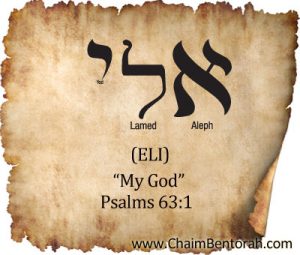HEBREW WORD STUDY – MY GOD – ELI אלי
Psalms 63:1: “Psalm of David, when he was in the wilderness of Judah. O God, thou [art] my God; earnestly will I seek thee: my soul thirsteth for thee, my flesh longeth for thee in a dry and thirsty land, where no water is;”
 This Psalm is attributed to David while he was in the wilderness. Most Bible Scholars believe it was written at the time David was fleeing from Saul. Some feel it was written while he was fleeing from his son Absolam, most likely it was when he was fleeing from King Saul as this is written with the style that he wrote in his youth.
This Psalm is attributed to David while he was in the wilderness. Most Bible Scholars believe it was written at the time David was fleeing from Saul. Some feel it was written while he was fleeing from his son Absolam, most likely it was when he was fleeing from King Saul as this is written with the style that he wrote in his youth.
Here is what I found most interesting in this verse. He starts off by saying “Elohim” that is: “O God” then he says: “Eli” or “My God.” The first time he uses the plural and the when he puts a personal pronoun to the word God he uses the word God in a singular form. When Jesus addressed God as His father he also used the word God in a singular form in the Aramaic “Elio.” The plural in Hebrew and Aramaic is a bit different than the plural in English. In English plural always means more than one, but in Hebrew it could also mean the most important one. In other words, the plural in Hebrew could often express a relationship and position rather than a multiple expression. In this case, we could render it as “Your Highest.” This is evident in the use of the word ‘ashachareka which comes from the root word shachar which the KJV renders as earnestly. It is not that this is incorrect but shachar expresses an earnestness only in the sense of priority. Many translations will more accurately render this as early in the morning will I seek you. It is usually in the morning when you set your priorities. My study partner pointed out that what happens in the morning often sets the tone or direction of your day. You wake up on the wrong side of your bed (which has a wall) bam! You start off with a headache and that is pretty much the way your day goes.
The Talmud gives the best explanation of this by telling the story of a king who started his day with a meeting with his servants/advisors. He set a specific time to meet and shows up a half hour early only to find one servant already present waiting for him. The king asks: “Where are the rest?” The servant replies, “The meeting is not for another half hour, but I am here.” With that, the king does not sit on his throne or put on his robes but sits down with his servant to just chat. When the others arrive the king puts on his crown, robes and sits on the throne to conduct business. This goes on for many days with the servant arriving early and the king sitting down with the servant just to chat. Before long he develops such a trust in this servant that he begins sharing his heart with him during this early morning.
This is why David uses this intensely personal address Eli – my God. It is sort of like a personal friend of a king who pays a visit. He first follows proper protocol by saying; “You highest” and then breaking protocol he would say: “My dear friend.” After many days, months, perhaps years of meeting with the king on a personal level, one on one, he has earned the right to not only approach his king in a formal way as “You highest.” But he has also earned the right to call him: “My Dear Friend.”
Many Christians only speak to God during a worship service or when with other believers gather to worship God. They never show up shachar, early, that is to be with God one on one. They never, like Israel, enter that cloud when given the opportunity, but like with Moses, they say to their pastor or teacher, “You go in the cloud and you tell us what God says.” They are the ones who can only refer to God in the formal way of “Your highest.” But those who seek Him every day in prayer and Bible study, who are not afraid to enter that cloud and hear for themselves what God has to say, they are the ones who can not only address God as “Your Highest,” but as “My Dear Friend” as well.
PART II TOMORROW “I THIRST FOR YOU.”








Chaim, I so appreciate how you bring out the personal and intimate aspects of relating with God. It is so easy to allow life to fluster us into only coming to God in times of need. It is a good and necessary practice to remind ourselves to slow down and ‘sink’ into His Presence, just because of Who He is.